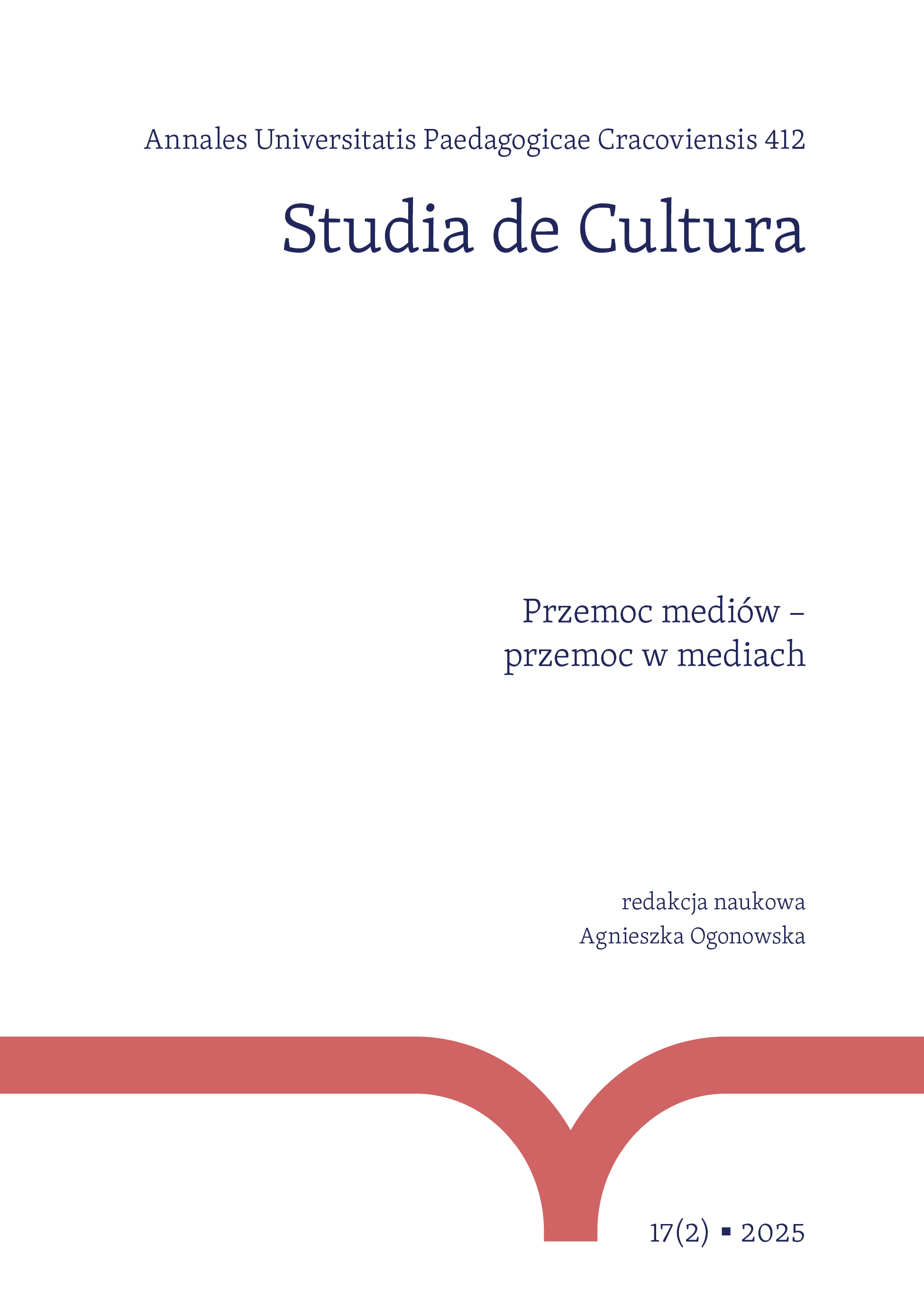Abstract
This research lies at the intersection of discourse analysis, pragmatics, and syntax. Its aim is to explore how violence is portrayed in social campaigns against animal cruelty. We examine the role of the linguistic message, as well as the denoted and connoted iconic messages. In terms of the linguistic message, we emphasize the intensity of binary structures and their correlation with the connoted iconic message.
References
Adam Jean‑Michel, Bonhomme Marc. 2012. L’argumentation publicitaire. Rhétorique de l’éloge et de la persuasion. Paris.
View in Google Scholar
Amossy Ruth. 2006. L’argumentation dans le discours. Paris.
View in Google Scholar
ARPP. Recommandation image et respect de la personne. https://www.arpp.org/nous-consulter/regles/regles-de-deontologie/image-et-respect-de-la-personne/ (dostęp: 6.07.2024).
View in Google Scholar
Bally Charles. 1965 [1932]. Linguistique générale et linguistique française. Berne.
View in Google Scholar
Barthes Roland. 1985. „Retoryka obrazu”. Maria Bożena Fedewicz (przeł.). Pamiętnik Literacki R. LXXVI (3). 289–302.
View in Google Scholar
Boguni‑Borowska Małgorzata. 2004. Reklama jako tworzenie rzeczywistości społecznej. Kraków.
View in Google Scholar
Bralczyk Jerzy. 2004. Język na sprzedaż, czyli o tym, jak język służy reklamie i jak reklama używa języka. Gdańsk.
View in Google Scholar
Buffon Bertrand. 2002. La parole persuasive. W: Théorie et pratiques de l’argumentation rhétorique. Bertrand Buffon. Paris. 393–415.
View in Google Scholar
Charaudeau Patrick. 2000. „L’événement dans le contrat médiatique”. Dossiers de l’audiovisuel nr 91. https://www.patrick‑charaudeau.com/L‑evenement‑dans‑le‑contrat.html (dostęp: 1.07.2024).
View in Google Scholar
Charaudeau Patrick. 2009. „Le discours de manipulation entre persuasion et influence sociale”. Acte du colloque de Lyon. https://www.patrick-charaudeau.com/Le-discours-de-manipulation-entre-persuasion-et-influence-sociale.html (dostęp: 1.07.2024).
View in Google Scholar
Charaudeau Patrick. 2005. Le discours politique. Les masques du pouvoir. Paris.
View in Google Scholar
Charaudeau Patrick, Maingueneau Dominique. 2002. Dictionnaire d’Analyse du Discours. Paris.
View in Google Scholar
Everaert‑Desmedt Nicole. 1984. La communication publicitaire : étude sémio‑pragmatique. Louvain-la-Neuve.
View in Google Scholar
Grzmil‑Tylutki, Halina. 2008. „Gatunki dyskursywne a strategie manipulacyjne”. Tekst i Dyskurs nr 1. 67–78.
View in Google Scholar
Hajok Alicja, Miladi Lidia. 2024. „Jeu des pôles personnels dans la publicité verte en français et en polonais”. Studia Romanica Posnaniensia t. 51(1). 65–81.
View in Google Scholar
Hajok Alicja, Miladi Lida. 2023. „Émergence de sens multiples dans le discours : sur l’exemple des structures lexico‑syntaxiques des slogans”. Roczniki Humanistyczne t. 71(6). 113–129.
View in Google Scholar
Hajok Alicja, Miladi Lidia. 2020. „Le choix des structures syntaxiques peut‑il avoir un effet manipulatoire sur l’auditoire? ”. Neophilologica Vol. 32. 117–131.
View in Google Scholar
Jeangène Vilmer Jean‑Baptiste. 2018. L’éthique animale. Paris.
View in Google Scholar
Kiesler Reinhard. 2000. „Où en sont les études sur la mise en relief ?”. Le Français Moderne t. 68(2). 224–238.
View in Google Scholar
Konstańczak Stefan. 2012. „Dyskurs przemocy”. W: W(okół) współczesnej filozofii francuskiej. Bogna Choińska (red.). Zielona Góra. 293–327.
View in Google Scholar
Korzeniak Marta. 2019. Gwiazdy walczą z nami o koniec hodowli futerkowej. https://www.otwarteklatki.pl/blog/gwiazdy-walcza-z-nami-o-koniec-hodowli-futerkowej (dostęp: 6.07.2024).
View in Google Scholar
Koszembar‑Wiklik Małgorzata. 2015. „Motywy erotyki, śmierci i przemocy w reklamach – o manipulowaniu emocjami odbiorcy i przesuwaniu granic społecznego tabu”. Naukowy Przegląd Dziennikarski nr 2. 65–84.
View in Google Scholar
Lugrin Gilles. 2006. Généricité et intertextualité dans le discours publicitaire de presse écrite. Berne.
View in Google Scholar
Maison Dominika, Wasilewski Piotr 2008. „Historia reklamy społecznej”. W: Propaganda dobrych serc, czyli pierwszy tom o reklamie społecznej. Dominika Maison, Piotr Wasilewski (red.). Kraków.
View in Google Scholar
Miladi Lidia. 2016. „Amplification de la mise en relief dans les slogans publicitaires à l’aide d’adverbes intensifs”. Synergies Pologne nr 13. 41–53.
View in Google Scholar
Miladi Lidia. 2017. „Quelques marqueurs contribuant au renforcement de la mise en relief dans les slogans publicitaires ”. Synergies Pologne nr 14. 107–119.
View in Google Scholar
Miladi Lidia. 2021. „La fabrication de la mise en relief dans les énoncés publicitaires d’accroche”. Lexique nr 29. 117–135. DOI: 10.54563/lexique.139 (dostęp: 12.05.2025).
View in Google Scholar
Mizdrak Martin. 2024. „Perswazyjny charakter reklamy społecznej na przykładzie wybranych kampanii społecznych na rzecz osób z Zespołem Downa”. Łódzkie Studia Teologiczne nr 33(1). 85–120.
View in Google Scholar
Müller‑Hauser Marie‑Louise. 1943. „La Mise en Relief d’une Idée en Français Moderne”. Romanica Helvetica vol. 21.
View in Google Scholar
Navarro Domínguez Fernando. 2005. „La rhétorique du slogan : cliché, idéologie et communication”. Bulletin Hispanique t. 107(1). 265–282.
View in Google Scholar
Puzynina Jadwiga. 1992. Język wartości. Warszawa.
View in Google Scholar
Rada Reklamy. 2023. Kodeks Etyki Reklamy. https://radareklamy.pl/kodeks‑etyki/ (dostęp: 6.07.2024).
View in Google Scholar
Soulez Guillaume. 2004. „Rhétorique, public et manipulation”. Hermès nr 38. 89–95.
View in Google Scholar
Warchala Jacek. 2019. Formy perswazji. Katowice.
View in Google Scholar
Trésor de la langue française. http://atilf.atilf.fr/ (dostęp: 6.07.2024).
View in Google Scholar
Słownik Języka Polskiego PWN. https://sjp.pwn.pl/ (dostęp: 6.07.2024).
View in Google Scholar

This work is licensed under a Creative Commons Attribution-NonCommercial 4.0 International License.
Copyright (c) 2025 Annales Universitatis Paedagogicae Cracoviensis. Studia de Cultura

